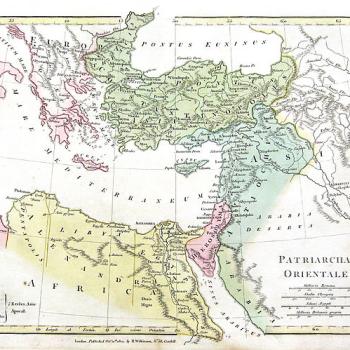Editorial Note: This is the final installment in a four-part series on the Civil War and the ways in which the North and South each perceived itself as a "Christian nation." If you missed them, read Part One, Part Two, and Part Three.
In last week's column I argued that members of the Confederate States of America believed that they were a "Christian nation" because their Constitution acknowledged "Almighty God." But this was not the only argument they made to justify their special standing as a nation that was favored by God. Slavery also had something to do with it.
How could the Confederacy claim to be a Christian nation and still keep four million slaves in bondage? The North asked this question relentlessly during the Civil War era, and in response the South developed an increasingly sophisticated answer. The political and religious leaders of the Confederacy had little problem reconciling slavery with their claim to a Christian civilization. The 19th-century South always understood itself to be a society informed by the teachings of the Bible. And nowhere in the New Testament, they claimed, did the Bible condemn slavery.
Southern clergy justified slavery with a host of biblical passages. In the book of Philemon, for example, the apostle Paul urged Onesimus, Philemon's runaway slave, to return to his master. Romans 13, a passage employed by many Northerners in their arguments against Southern secession, could also be used by Southerners as a biblical injunction for the submission of slaves to their masters. And of course, there were always passages such as Ephesians 6:5: "Slaves obey your earthly masters with respect and fear, and with sincerity of heart, just as you would obey Christ."
Thomas Dew, a professor of political science at the College of William and Mary, used the Bible to defend the idea that all societies had a fixed and natural social structure. Citing 1 Corinthians 7:20-21, he argued that slaves should remain slaves because God had made them to fulfill such a role in society. They had been given a divine "calling" and, in Paul's words, "each one should remain in the condition in which he was called."
Southerners reserved harsh judgment for what they perceived as the unbiblical approach to slavery taken by Northern abolitionists. In claiming that slaves should be set free, abolitionists violated the explicit teachings of scripture. Robert L. Dabney, a Virginia Presbyterian clergyman and one of the strongest defenders of slavery in the South, argued that Christianity had always taught that slavery is a permissible institution.
The notion that slaves had "rights" and thus deserved freedom was a modern idea that had been introduced in the 18th century by the progressive thinkers of the Enlightenment. As Dabney put it: "Neither primitive, nor reformed, nor Romanist, nor modern divines taught the doctrine of the intrinsic sinfulness of slaveholding. The church as a body never dreamed of it." Instead, it was the "political agitators of atheistic, Jacobin France" and a few misguided Christians, such as John Wesley, who first popularized abolitionism, "almost eighteen hundred years after Christ's birth." Dabney represented the traditional culture of the 19th-century South—a culture that distrusted the kind of progress that defined modern life. Dabney preferred to cling to nearly two thousand years of biblical scholarship defending the validity of slavery.
Southerners believed that abolitionism had no biblical legs to stand on. Anyone who believed that slavery was wrong, they argued, would have to abandon a high view of the Bible's authority. William Lloyd Garrison was a prime example of this trend. When Garrison came to terms with the fact that the Bible seemed to support slavery, he rejected the Bible—or at least its literal interpretation. Writing in his abolitionist magazine, The Liberator, Garrison said, "To say that everything contained within the lids of the bible is divinely inspired, and to insist upon the dogma as fundamentally important, is to give utterance to a bold fiction, and to require the suspension of the reasoning faculties. To say everything in the bible is to be believed, simply because it is found in that volume, is equally absurd and pernicious."
These kinds of public declarations concerning the Bible became fodder for Southern attacks on Northern infidelity. James Henry Thornwell, another powerful theological voice in support of slavery, understood the Civil War as a clash between atheist abolitionists and virtuous slaveholders: "The parties in this conflict are not merely abolitionists and slaveholders—they are atheists, socialists, communists, red republicans, Jacobins, on the one side, and friends of order and regulated freedom on the other."





